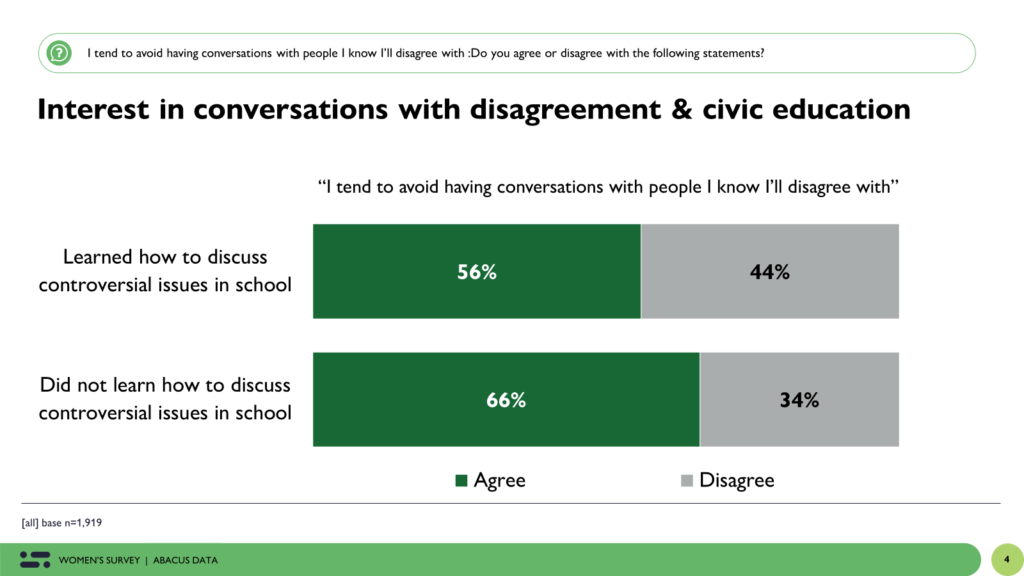Canadians Lack Basics of Civic Education and It’s Impacting Our Democracy
2024 is the year of elections, both at home and abroad. Politics, social issues, and our civic institutions will be on display as millions head to the polls. This got us thinking about the civics education we’ve received in school and its impact on us as citizens today. In December we asked some questions on civic education to understand its relationship to us as engaged citizens.
The data below is from an online survey conducted from December 7th to 12th 2023 with n=1,919 adults in Canada. The data was paid for by Abacus Data.
A third of Canadian adults don’t recall learning anything about civics in school. And the results for several key aspects of civic education are also quite poor. Only a third recall learning about current events (39%), how institutions and governments work (38%), and the roles and responsibilities of being a citizen (37%). Only 1 in 10 Canadians say were taught how to discuss controversial issues.

Alberta performs the best (only 21% don’t recall learning anything). Compared to other parts of the country, civic education is much more limited in Quebec (55% of Quebec residents don’t recall learning anything about civics).
Younger Canadians are far more likely to have had a well-rounded civics education in school, but civics education overall could still see significant improvements. Still only half (48%) of Canadians 18 to 29 recall learning about their role and responsibilities as a citizen, fewer still recall learning about how institutions work in Canada (39%).
These results are concerning for two reasons; the impact it has on engagement with democratic institutions, including exercising one’s right to vote, and its impact on discourse among Canadians themselves.
Those who did not learn how institutions and governments work are far less likely to vote as adults.
Those who can’t recall learning about how institutions and government are 10-points less likely to say they voted in the last federal election. Those who can’t recall learning about current events are 9-points less likely to say they voted in the last federal election.
Learning about civics also increases interest in voting in future elections. Canadians who have learned about institutions and governments and current events have a much stronger intent to vote in upcoming elections.
Canadians who did not learn civic engagement skills in school are much less likely to enjoy discussing social issues with their friends and family. Among Canadians who recall learning at least one civic engagement skill, 74% say they like discussing social issues with family and friends. This drops to 62% for those who cannot recall learning about civics in school.

And finally, those who didn’t learn how to discuss controversial issues are more likely to avoid conversations with folks they disagree with. This can create further division and divide in a time where opinions and discussions are already highly polarized. This is concerning, given only Considering only 13% of Canadians have these skills,

THE UPSHOT
Providing civics education in classrooms across the country equips Canadians with applicable skills and knowledge for the future but also provides fundamental information to ensure children grow up to become informed and involved voters. From our research we can see there is a relationship between the skills and information taught during K-12 education and the actions and engagement of Canadians in adulthood.
Beyond encouraging participation in democracy by voting, we can see that learning about civics in school encourages us to be engaged in our own communities and networks, and foster the dialogue that is also important to maintaining a strong democracy. As part of our research on civic engagement we worked with CIVIX on their State of Civic Education report. To read the full report, click here: http://www.civix.ca/report
Methodology
The survey was conducted with 1,919 Canadian adults from December 7 to 12, 2023. A random sample of panelists were invited to complete the survey from a set of partner panels based on the Lucid exchange platform. These partners are typically double opt-in survey panels, blended to manage out potential skews in the data from a single source.
The margin of error for a comparable probability-based random sample of the same size is +/- 2.24%, 19 times out of 20.
The data were weighted according to census data to ensure that the sample matched Canada’s population according to age, gender, educational attainment, and region.
Abacus Data follows the CRIC Public Opinion Research Standards and Disclosure Requirements that can be found here: https://canadianresearchinsightscouncil.ca/standards/
ABOUT ABACUS DATA
We are the only research and strategy firm that helps organizations respond to the disruptive risks and opportunities in a world where demographics and technology are changing more quickly than ever.
We are an innovative, fast-growing public opinion and marketing research consultancy. We use the latest technology, sound science, and deep experience to generate top-flight research-based advice to our clients. We offer global research capacity with a strong focus on customer service, attention to detail, and exceptional value.
We were one of the most accurate pollsters conducting research during the 2021 Canadian election following up on our outstanding record in 2019.
Contact us with any questions.
Find out more about how we can help your organization by downloading our corporate profile and service offering.